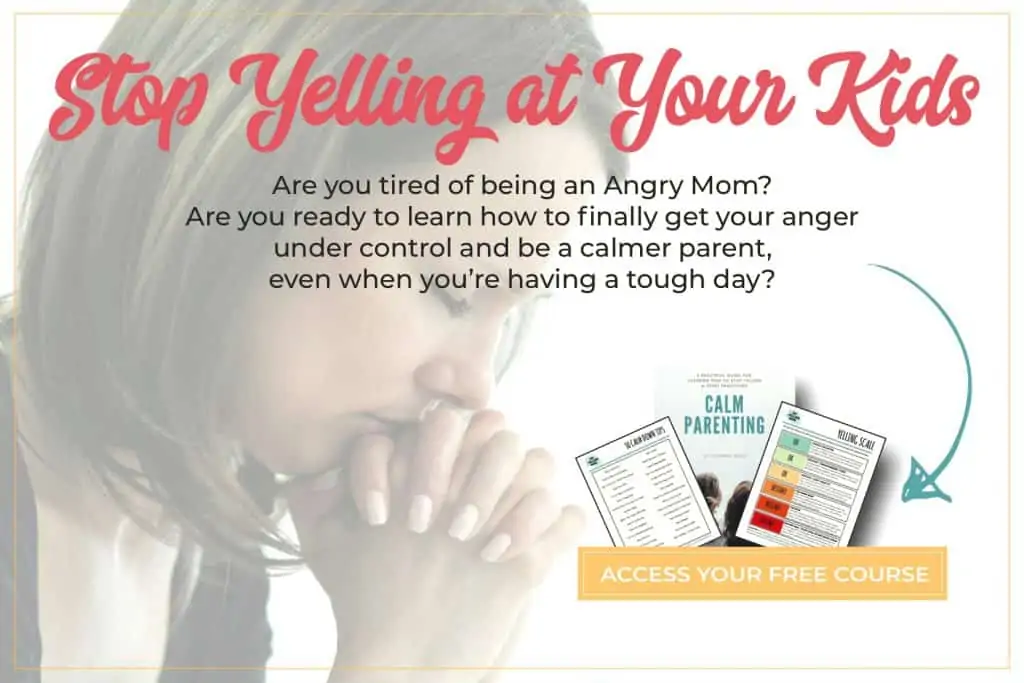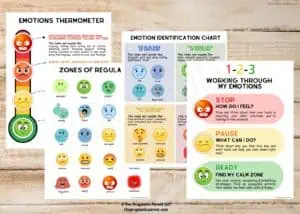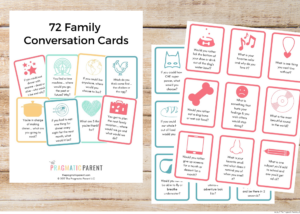A bike helmet protects your child’s head from injury, a lifejacket keeps them from drowning and car seats protect them in the case of a car accident – these are all preventative tools that avert harm from your children and help keep them safe. While safety equipment is important for the safety of our kids, prevention also includes parenting choices, communication, setting limits and creating a safe environment.
From the minute my kids were born, I became a Mama Bear. I want to keep them safe and protected without being overbearing and clingy.
I worry about parking lots and drivers that sped through red lights or too fast in school zones, crowds and how easily they could slip away and get lost and especially unsafe people.
My parents never had safety talks with us, we never discussed unsafe touching or bad strangers and I didn’t live in a home where I felt comfortable going to my parents to talk about anything that might have happened to me. I knew to look both ways before crossing the street and to never get in a car with a stranger but that left a lot of gray areas I had to navigate on my own.
The environment I am creating for my children is open and honest, safe and comfortable. With these 10 prevention tips we use, we are intentionally working to create relationships with our children to prepare them for the world but keep them safe at the same time.
Some of these 10 prevention tips are common sense and you may already do a handful of them, but others may be helpful and worth considering.
1) DON’T LEAVE CHILDREN UNSUPERVISED
Don’t leave your children unsupervised, even for a minute and especially when they’re outside of your home. This includes playgrounds, parking lots, at the grocery store, the zoo, amusement locations and even in your neighborhood. You should what your children are doing and where they are at all times.
When your children are older, always implement the buddy system so that they’re with a friend when they’re walking places or are somewhere without you.
2) TEACH YOUR CHILDREN ABOUT TRICKY ADULTS
Stop using the words stranger and replace it with Tricky People.
Tricky adults are grownups – even teenagers – who are asking kids for help, trying to get children to break safety rules or hurt or touch their body. Why would an adult ask a child for help? Adults don’t need help! These are NOT safe grownups. Teach your children to not listen to tricky adults and certainly not to go anywhere with someone who is a tricky person or that they don’t know.
Trick people aren’t always strangers; they can be a relative, family member, friend’s sibling, neighbor or an acquaintance. They can be someone you know well, might only be an acquaintance or not know at all.
3) REHEARSE UNSAFE SITUATIONS
The best way to prepare your child, if they are even in an uncomfortable situation, is to talk honestly about “what if” safety strategies. For example:
- What would you do if you were asked by a stranger to help look for their dog who is lost? What if they asked you to get in their car to go look?
- What if you were lost in the store, what would you do?
Here is a great article on Safety Rules every child needs to know.
4) TEACH KIDS YOUR REAL NAME, ADDRESS & PHONE NUMBER
Your children should know their parent’s full names – your real full-names – not just Mom and Dad. You should also teach your children your home address and phone numbers and if they’re too young to learn these, label their belongings such as a backpack, lunchbox, water bottle or have them wear a bracelet with this information on it.
5) READ BETWEEN THE LINES TO FIND YOUR CHILD’S TRUE FEELINGS
Pay attention and read between the lines when your kids say they don’t like playing with certain kids, visiting someone, spending time with a particular person such as a relative, babysitter, family friend or friend of a friend. This is a red flag or a signal that you might be unaware of. You should never force them to be around this particular person or environment.
6) SET LIMITS ON PRIVACY
Going to the bathroom with the door closed is respectful privacy. Your child wanting to have alone time in their room by themselves is respectful privacy. A group of friends in the bedroom with the door closed is not respectful privacy and should be off-limits. If the door is closed, you don’t know what’s going on in the room – even if it’s just fun play or inappropriate.
Keep doors open in your house, especially during play dates and with older children – even relatives and your kid’s friend’s siblings. While kids may seem like they’re acting innocent, you may want to consider restricting or limiting social media behind closed doors as well where bullying, inappropriate talk or above age-range and off-limits discussions and picture viewing can easily take place.
7) AVOID PERSONALIZED CLOTHING + UNSAFE STICKERS
Personalized clothing – your kid’s name on a backpack or shirt – is a calling card for someone who is trying to get the attention of your child. If a stranger uses your child’s first name, it can confuse your kid into thinking they know this person and they may be more open to the manipulation of this person or even getting in their car or leaving with them.
What’s also circulating these days is the danger of having personalized stickers on the back of your car. If you have family stickers with two adults and two kids and bumper stickers that say something like “honor student at Eagle Middle School“ and “Proud Parent of Skyhawk Hockey Player,” you’re making it very easy for someone to track down your child. They know how many kids are in your family, possibly names, where they go to school and extracurricular activities they participate in.
8) DON’T ALLOW SECRETS
Create a family rule that no secrets are allowed and especially if it involves private parts and unsafe touching. Secrets that make your kids feel uneasy or as if they’re breaking rules about their body or personal space; is a bad secret. Teach your children that it’s always ok to tell a parent or a safe adult these types of secrets because bad secrets need to be shared.
9) RESPECT YOUR CHILD’S CHOICES ABOUT THEIR BODY
Your child has the power to make choices about their body. Nobody can touch their body – including hugs, kisses, touching or sitting on laps – without your child’s permission. Help them listen to their inner voice (those uneasy feelings are important to notice) and express themselves when they don’t want another person to touch them. Empower your children about their bodies even at a young age.
I know we don’t force our children to hug or kiss relatives or even Mom and Dad if they don’t want to. It’s their choice, we respect that and want them to know they can set boundaries and limits about their bodies, even at 1 or 2 years old.
10) STAY CONNECTED WITH YOUR KIDS
Having a relationship with your child is the absolute best prevention you can create for their protection. Spending time with your kids, having honest and open communication and being available for them will let them know they are loved. If you don’t spend time with your kids and they are looking for the attention they aren’t getting at home, they may look in the wrong place to fill this void.
Children that are close to their family, have loving relationships and honest talks, are less appealing to predators. Predators will intentionally target children who don’t have close relationships with their parents, are looking for attention and the parents won’t notice because they aren’t as involved.
Teach and talk about safety rules and about unsafe situations in a casual manner. If you use scare tactics and create a fearful environment, your child may be afraid to talk to you or fearful of your reaction. If they do share information that has violated a rule, make sure you reinforce that your reactions aren’t angry, upset or mad and directed at the child, but at the perpetrator and they did the right thing coming to you.
WANT MORE?
- Educating Children on Body Safety
- Critical Safety Rules Every Kid Needs to Know
- Identifying a Predator and Protecting Your Kids
- Know the 5 Signs of Drowning When You Only have 20-60 Seconds to Save a Drowning Victim
- Why You Say Yes to Your Child More Often – Learn the Magic Rule of 5:1
- Want to Raise Confident Kids? Do This!
- Teach Your Children How to Choose the *Right* Friends




